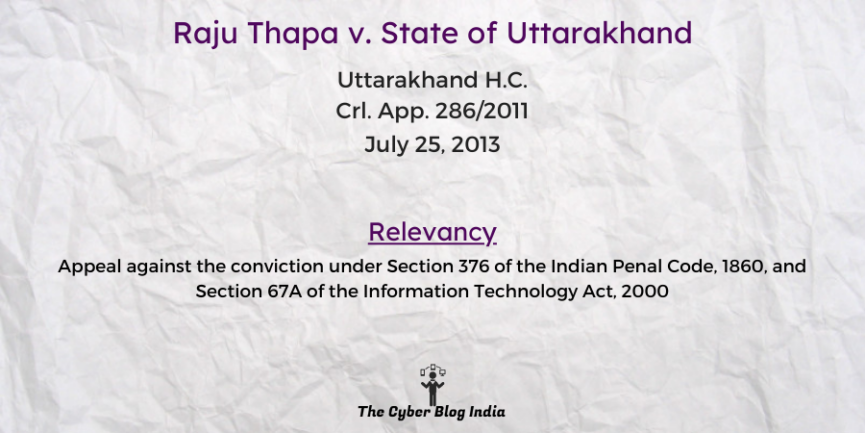Raju Thapa v. State of Uttarakhand

Raju Thapa v. State of Uttarakhand
In the High Court of Uttarakhand
Crl. App. 286/2011
Before Justice B S Verma
Decided on July 25, 2013
Relevancy of the case: Appeal against the conviction under Section 376 of the Indian Penal Code, 1860, and Section 67A of the Information Technology Act, 2000
Statutes and Provisions Involved
- The Information Technology Act, 2000 (Section 67A, 67B)
- The Indian Penal Code, 1860 (Section 376, 506)
- The Code of Criminal Procedure, 1973 (Section 313, 374)
Relevant Facts of the Case
- An appeal was made under Section 374 of the Code of Criminal Procedure, 1973, against the judgment convicting the accused Raju Thapa under Section 376 of the Indian Penal Code and Section 67A of the Information Technology Act, 2000.
- A Nepali customer visited a photo studio owned by Mr Darshan Singh to load picture songs on his phone. Mr Darshan Singh found an obscene video of the prosecutrix on his mobile phone.
- The complainant (prosecutrix’s uncle), then lodged a written report at the police station stating that his niece aged 14 years, studying in class 10th, was forcibly raped two years ago by Mr Raju Thapa, a former teacher of Gairad Bilkhet School.
- The accused had also prepared an obscene mobile clip after threatening to fail her in the class if she did not agree to do as told, due to which she could not narrate the occurrence to anyone.
- The complainant also handed over the CD containing the mobile clip at the police station. A charge sheet was filed by the Investigating Officer after investigating the matter to which the accused denied the charges and claimed his trial.
- The learned Sessions Judge after considering the entire evidence on record and having heard the counsel for the parties found the accused guilty of offences under Section 376 Indian Penal Code and Section 67A of the Information Technology Act, 2000 and passed judgment against him.
- Feeling aggrieved, the accused-appellant preferred this appeal.
Prominent Arguments by the Advocates
- The petitioner’s counsel argued that there has been an inordinate delay in lodging the FIR. Therefore, the whole prosecution case based on this FIR, cannot be relied upon. Apart from this, no effort was made by the prosecution to prove the factum of recording obscene mobile video taken by the accused on the mobile. Further, the computer hard disc was not produced before the court for forensic examination. Also, no date and time of occurrence were mentioned by the prosecutrix in her statement. The prosecution failed to prove its case and thus the accused-appellant is entitled to get the benefit of the doubt in the case.
- The respondent’s counsel argued that, in sexual offences, delay in lodging FIR has to be considered with a different yardstick. The accused was the class teacher of the victim and he had committed rape on her after threatening to fail and expel her from the class, along with threats to her life. As the honour of family was involved, the prosecutrix did not mention the incident to anyone and was compelled to tell the truth when the video recording came to light. Therefore, the delay can be explained satisfactorily. In support of her contention, learned counsel relied on the cases, Satpal Singh v. State of Haryana (2010 CRI. J. 4283) and State of U.P. v. Manoj Kumar Pandey (AIR 2009 SC 711).
Opinion of the Bench
- The circumstances of the video clips do not make a complete chain of events which may infer that the video clipping was prepared by the accused. Darshan Singh, owner of the photo studio, did not produce the hard disc of the computer as primary evidence to prove the factum of recovery of MMS from the mobile of the Nepali customer. He had produced the CD without any forensic examination of the mobile of the accused. This does not prove that the accused prepared the video, particularly when in the disputed video, the person shown committing rape is not identifiable. Hence, the charges levelled against the accused-appellant stand not proved.
Final Decision
- Appeal allowed.
- Impugned order set aside.
This case summary has been prepared by Shrawani Mohani, an undergraduate student at ILS Law College, Pune, during her internship with The Cyber Blog India in January/February 2021.
